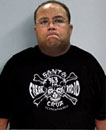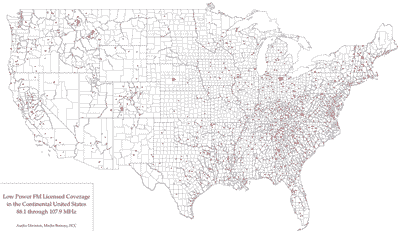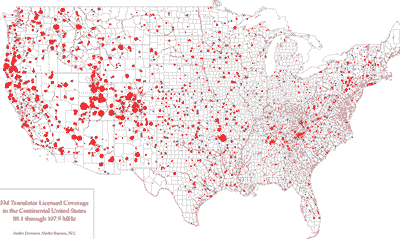During the FCC’s mostly-failed media ownership revision-quest of 2003, the agency cooked up a bunch of “research” to justify trying to let big media grow even bigger. However, one report with real integrity never made it out the door.
 The agency’s Media Bureau studied local television news coverage, and tallied up the amount of actual local news stations produced, and correlated that to station ownership. It turns out that locally-owned stations produce as much as 33 hours more local news per year than stations owned by chains or networks. The study also concluded that cross-ownership – the ownership of a TV station and/or newspaper and/or radio by one company in a single market – did nothing to enhance a TV station’s local news coverage. In fact, cross-owned properties more often than not produce less local news. Continue reading “Mikey Powell, Document-Shredder”
The agency’s Media Bureau studied local television news coverage, and tallied up the amount of actual local news stations produced, and correlated that to station ownership. It turns out that locally-owned stations produce as much as 33 hours more local news per year than stations owned by chains or networks. The study also concluded that cross-ownership – the ownership of a TV station and/or newspaper and/or radio by one company in a single market – did nothing to enhance a TV station’s local news coverage. In fact, cross-owned properties more often than not produce less local news. Continue reading “Mikey Powell, Document-Shredder”
Category: FCC
Bettendorf Pirates Receive $27k in Fines
The two principals behind the high-profile pirate “Power 103.3” in Bettendorf, Iowa have been handed stiff monetary forfeitures by the FCC. Matthew Britcher, self-proclaimed “promotions director” of the commercial-format station, is being asked to pay $17,000 for running the station and refusing an FCC agent’s request to inspect it. Jason Duncan, quoted in local media as a “co-owner,” received a $10,000 forfeiture.
This is the first FCC case to get this far in which the pirates invoked 47 CFR 73.3542 as a defense; this little-known statute allows for emergency broadcast services in times of war or national emergency. Britcher and Duncan called it the “War Powers Act,” and some other pirate stations are treating it as a license-free pass, but it is nothing of the sort. Continue reading “Bettendorf Pirates Receive $27k in Fines”
FCC Maps Translator, LPFM Coverage
From the half-glass department: check this map of licensed LPFM station coverage in the continental United States (click for larger versions):

Now, a map of licensed FM translator station coverage:
 Continue reading “FCC Maps Translator, LPFM Coverage”
Continue reading “FCC Maps Translator, LPFM Coverage”
FCC Does Media Ownership Redux
On June 28 the FCC voted to restart its project to revise its media ownership rules. The formal Notice of Proposed Rulemaking to begin this process was released last week. The agency last tried to do this in 2003, but most of its proposed changes were blocked by court order in 2004.
The last time around was a near-disaster. Then-chairman Mikey Powell tried to ram through a christmas-load of changes that would have let large media conglomerates get much larger. The FCC tried to use hopelessly biased “research” to justify industry moguls’ wet dreams. Millions of people cried foul on the scheme, and it still took the courts to stop it. Continue reading “FCC Does Media Ownership Redux”
NAB Seeks FM Translator-Grab for AM Stations
A very intriguing ![]() Petition for Rulemaking was recently filed by the National Association of Broadcasters. It asks the FCC to let the owners of AM stations apply for FM translators, so that they may rebroadcast their AM signals to provide better service, especially at night, when many AM stations must operate at reduced power or go off the air completely. NAB believes the FCC needs to give a much-needed “boost” to the lot of these beleaguered stations.
Petition for Rulemaking was recently filed by the National Association of Broadcasters. It asks the FCC to let the owners of AM stations apply for FM translators, so that they may rebroadcast their AM signals to provide better service, especially at night, when many AM stations must operate at reduced power or go off the air completely. NAB believes the FCC needs to give a much-needed “boost” to the lot of these beleaguered stations.
The FCC has considered and rejected this very notion twice in the last 25 years, but NAB thinks the third time is the charm because of new sources of interference to the AM band. What new sources? Computers and traffic signals are mentioned, but a footnote otherwise plugging digital radio casually drops the comment that AM broadcasters are “encountering ever more interference problems as a result of an increase in ambient noise.” Continue reading “NAB Seeks FM Translator-Grab for AM Stations”
Sirius Confesses to Power-Jacking Transceivers
Sirius Satellite Radio also filed a document with the SEC this week with regard to overpowered satellite-to-FM transceivers and its role in developing and marketing them. Check this:
[C]ertain Sirius personnel requested manufacturers to produce Sirius radios that were not consistent with the FCC’s rules. As a result of this review, we are taking significant steps to ensure that this situation does not happen again…. Continue reading “Sirius Confesses to Power-Jacking Transceivers”
Microradio's Second Wave
The FCC has now conducted more enforcement actions against unlicensed AM and FM stations in the first half of 2006 than it did in the entirety of 2005, which broke all previous records for cat-and-mouse action. However, this milestone was reached by a bit of paperwork puffery on the part of the FCC. For example, as field agents hunted recent activity on San Francisco Liberation Radio‘s old frequency (93.7), they sent warning letters to two people and the owner/manager of the building they apparently live in. In the recent past, tagging one would have sufficed.
This year the FCC also broke its drought of issuing forfeiture (fine) notices to pirate stations. Four people have been presented with $10,000 government invoices so far this year, compared with none in 2005. Each case took at least a year to reach that level of escalation, and based on the FCC’s prior collection history, it will be lucky if it actually sees dough from half of them. Continue reading “Microradio's Second Wave”
FCC Punts on HD Rulemaking
Thursday’s Commission meeting was delayed by five hours; during the delay the agency revised the meeting agenda, announcing that the digital radio item had been pulled. No reason given, except, “it isn’t done.” One could say the same about the HD Radio protocol itself, but that’s not stopping radio’s major players from shoving it onto the air.
In related news: how much fresh content does digital radio multicasting really offer? Most HD-R side-channels run what is called a “hard clock,” meaning a set playlist with few or no updates. According to Mark Lapidus, “When they [reviewers of HD radio receivers] don’t discover the repetition, I figure that they just really haven’t listened very much. However, real listeners will catch on quickly as they hear the same song at the same time every day.” What kind of content diversity does one expect when the largest provider of HD multicast programming is Clear Channel?
FCC to Further Rubber-Stamp IBOC/HD Radio
The Federal Communications Commission’s monthly meeting goes down on Thursday, and the second-to-last item on its agenda is the adoption of a Further Notice of Proposed Rulemaking on the certification of “HD Radio,” the digital audio broadcast technology of-choice for the U.S. radio industry.
Though the HD Radio system has not yet been formally certified, a relatively vigorous campaign is underway to deploy it. Rush deployment before formal certification of a technology results in what is called “the creation of facts on the ground,” demonstrating the technology’s functionality and increasing the pressure on its regulator to approve its usage (since it’s already out in the wild, failing to certify it puts the regulator in the position of nullifying billions of dollars of investment). Continue reading “FCC to Further Rubber-Stamp IBOC/HD Radio”
Translator-Monger Runs Afoul of Piracy
Earlier this month the FCC issued three Notices of Apparent Liability to a “Best Media, Inc.,” whose primary business model involves throwing up FM translator stations and then leasing them out to interested broadcasters. It would seem that Best Media is relatively new to this game: the licenses of three of the translators it received permits to operate in 2003 expired in 2004, and the company forgot to renew them for more than a year.
When the FCC twigged to the problem and opened an inquiry, Best Media sheepishly filed for license renewals. Not quick enough to avoid $21,000 in judgments – of which $9k is for muffing the paperwork and the balance for technically running pirate translators. Operating three unlicensed translator stations, therefore, is somewhat less egregious than running a single live-and-local pirate station, for which the FCC’s base fine begins at $10,000.